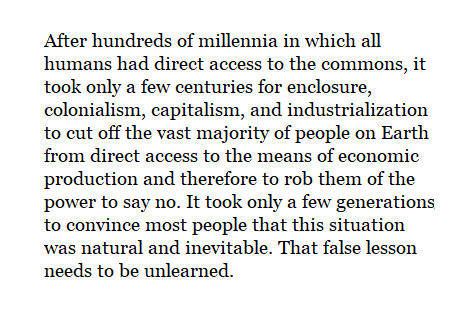71
How did we get here? (@[email protected])
c.imAttached: 1 image
[Note: this thread was copied from another instance with the full knowledge and endorsement of the original poster who wants to remain anonymous here.]
HOW DID WE GET HERE?
(a thread of threads, quotes, and links)
This is a collection of writings and research concerned with how we got where we are today, which is in fact the story of what has been done *to* us, and what has been *taken from us*.
By "us" we're talking about "the 99%", "workers", "wage slaves", all non-owners of private property, "the poor", unhoused people, indigenous people, even plenty of people who swear by capitalism and identify as "capitalist" yet have no capital of their own and no serious hope of ever having any worth speaking of. In other words almost everyone except for the very few who have had the power to exploit us and shape our lives to serve their agenda. We're going to examine institutions and concepts that have deeply altered our world at all levels, both our external and internal realities.
By "here" we are talking about climate crisis and myriad other environmental catastrophes resulting from hyper-excessive extraction, consumption and waste; a world of rampant inequality, exploitation and oppression, hunger and starvation, genocide and war; a world of fences, walls, gatekeepers, prisons, police, bullshit jobs and criminalized poverty; a world overrun with cars and preventable disease; a world of vanishing biodiversity and blooming fascism; a world where "democracy" results in being led by some of the worst of humanity; a world ruled by an imaginary but all-powerful and single-minded god: Capital.
Our inspiration and structural framework for this survey is this quote from THE PREHISTORY OF PRIVATE PROPERTY, an important book from political philosopher Karl Widerquist and anthropologist Grant S. McCall:
"After hundreds of millennia in which all humans had direct access to the commons, it took only a few centuries for enclosure, colonialism, capitalism, and industrialization to cut off the vast majority of people on Earth from direct access to the means of economic production and therefore to rob them of the power to say no. It took only a few generations to convince most people that this situation was natural and inevitable. That false lesson needs to be unlearned."
https://widerquist.com/books-3/#2b
Also recommended: PREHISTORIC MYTHS IN MODERN POLITICAL PHILOSOPHY
https://widerquist.com/books-3/#4b
1/30
I was originally planning to copy the whole post in a lemmy body, but mastodon makes it too painful to copy-paste as it truncates each link and images have to be copied manually. I also don’t know if it fits in a post body. Anyway, If anyone wants to try their hand at copy pasting it in its entirety here, feel free.



Have we forgotten the couple millennium of “divine right of kings”?
The divine right of kings was conceptualized in England by James I of the Stuart Dynasty in the 17th century, following the growing absolutism of the Tudors, and effectively ended just fifty years later when Cromwell executed Charles I.
Hardly two thousand years worth of it, even if you want to talk about how the idea wasn’t simply an English conceit.
My point isn’t that the fall of Rome didn’t usher in a dark age of democracy, even by Roman standards, but rather that claiming divine right is actually a pretty small portion of history, the Roman Emperors for example spent a lot of time talking about how they actually had the consent of the governed, even the ones who would execute you for treason for denying that they were literally a god.
And, of course, never forget what the most compelling counterargument to it is.
We can call it “sharply withdrawing the consent of the governed”
In truth statism hierarchy and by extent property seem to go hand in hand.
There was a monopolisation of the commons as far back as the earliest states of ancient mesopotamia, where the elites controlled the irrigation system and by extent the water, crucial for farmers to gain a substinance.